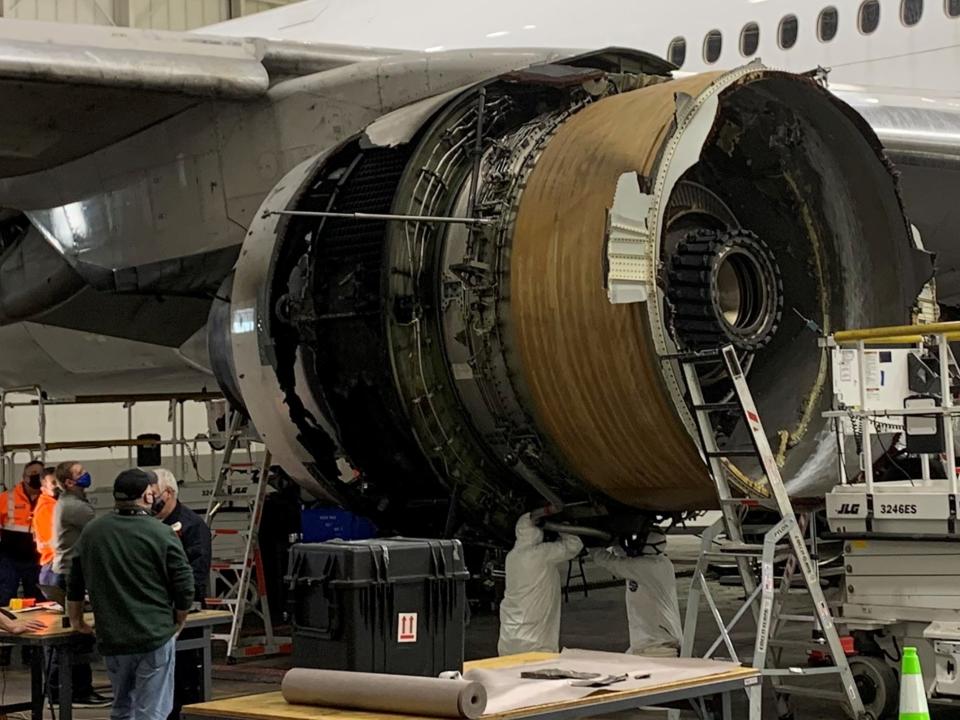Investigation reveals cause of Denver plane explosion that led to global grounding of Boeing 777s

The damaged starboard engine of United Airlines flight 328, a Boeing 777-200, is seen following a February 20 engine failure incident, in a hangar at Denver International Airport in Denver, Colorado, on 22 February 2021
((Reuters))A preliminary investigation has revealed that a damaged fan blade caused the Denver mid-air engine fire that led to the grounding of more than 100 Boeing 777s.
Federal investigators believe that wear and tear caused the fan blade to fracture and break off the Pratt & Whitney engine during the Hawaii-bound United Airlines flight on Saturday, National Transportation Safety Board (NTSB) chairman Robert Sumwalt said on Monday.
The chairman told reporters that after it broke, the blade chipped off half of a second blade, leading to multiple pieces of debris to fall to the ground in areas of Denver.
The engine failed just four minutes into the flight on Saturday, with a “loud bang” heard by passengers, and the preliminary assessment shows that the damage to the fan blade is consistent with metal fatigue.
Mr Sumwalt revealed that despite the dramatic nature of the incident, there was only minor damage to the aircraft body and no structural damage.
No one onboard was injured in the incident on Saturday, as the United Airlines plane returned safely to Denver International Airport shortly after the engine problem.
Watch: NTSB searches for answers on Denver plane incident
Although aircraft debris fell next to homes, gardens and soccer fields in Denver on Saturday, there was also no injuries reported on the ground.
The recovered pieces of debris are being flown to a Pratt & Whitney laboratory for examination on Tuesday, which will be supervised by NTSB investigators.
The investigators will also look over maintenance records to check to see whether problems may have been missed during safety inspections prior to the flight.
More than 100 Boeing 777s that use the same engine as the Denver United Airlines flight have been grounded in the wake of the incident, while the Federal Aviation Administration (FAA) investigates Pratt & Whitney blades.
Boeing recommended that the planes be grounded after Japanese safety regulators banned 777s with the same Pratt & Whitney 4000 engines, and United said it had voluntarily grounded its fleet on Sunday.
A couple of similar incidents have occurred over the past few years, and the FAA revealed on Monday that it was already considering adjusting fan blade inspections, following a problem with an engine during a Japanese flight in December 2020.
Although similar incidents are likely to be looked at, Mr Sumwalt stressed that what is important is “that we really truly understand the facts, circumstances and conditions around this particular event before we can compare it to any other event.”
Although the preliminary findings points to metal fatigue, NTSB inquiries can take up to a year to complete as all avenues will be looked at.
Mr Sumwalt added: “Our mission is to understand not only what happened but why it happened, so that we can keep it from happening again”.
Watch: Denver plane engine fire consistent with metal fatigue, investigators say
Read MoreEXPLAINER: Why a plane's engine exploded over DenverBoeing 777: planemaker calls for 128 aircraft with PW4000 engines to be grounded after Denver scare

 Yahoo News
Yahoo News 